Today we’re going to talk about the shelf life, storage, and spoilage of walnuts, both unshelled and shelled ones.
Say you’ve found an old pack of walnuts in the back of a cupboard. The nuts look quite alright, but they’re way past the “expiration” date, and you’re not sure if you can eat them. Do walnuts go bad?
If that’s the case, you’d probably like to know how long walnuts last and how to tell if a walnut is bad. And that’s what this guide is all about.
Let’s dive right in.
Table of Contents
- Do Walnuts Go Bad?
- How to Tell if Walnuts Are Bad?
- How Long Do Walnuts Last?
- How to Store Walnuts
- Can You Freeze Walnuts?
- Walnuts Shelf Life and Spoilage Summary
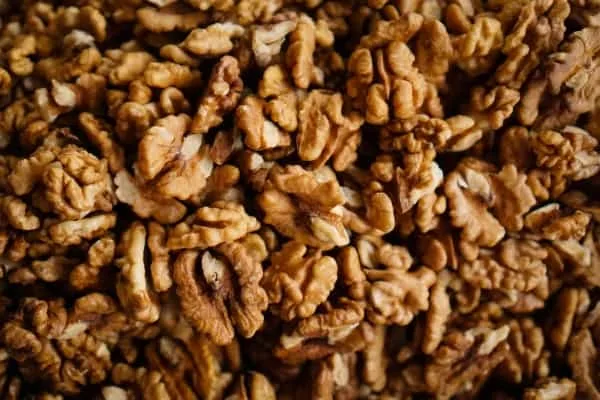
Do Walnuts Go Bad?
The most common way walnuts spoil is by going rancid. That happens because they’re either stored for too long or in poor conditions. Or both.
Like other relatively high-fat products, walnuts go rancid. You’ll know that yours are rancid when they start to taste harsh and biting instead of mild and nutty. Or smell like oil paint, but that’s not as common as flavor deterioration.
Rancid walnuts are fairly safe to eat, but they taste pretty awful. That means you should toss them the moment you notice the issue.
(You can eat them if you really don’t want to toss them or don’t mind the flavor, sure. But I wouldn’t fold them into muffins or cupcakes, or use them in any baking projects. Too much risk.)
Now, there are a few other ways walnuts might go bad. So let’s cover those as well.
How to Tell if Walnuts Are Bad?
Discard your walnuts if:
- You find any pantry pests in the bag. If you store walnuts at room temperature and find any insects, dead or alive, in the bag, it’s time to let it go. And clear the infestation as soon as possible, as those things spread like wildfire.
- They are rancid. There are a few ways to tell that your walnuts are rancid. The first, and most common one, is through flavor. If walnuts taste sharp and bitter, they are rancid. An off, paint-like or putrid smell is the second option. The last one is shriveled, dried-out, darker-than-usual nutmeat. If either is the case, you’re dealing with rancid walnuts. Obviously, you can only tell that your walnuts are rancid once you shell them.
- You notice mold. Mold growth is quite uncommon in nuts, but if it happens, you know what you need to do.
Once again, rancidity is by far the most common reason you’ll have to toss your walnuts.
Furthermore, walnuts go rancid quite easily. This is because they have quite a lot of polyunsaturated fatty acids that oxidize easily. So they aren’t like pistachios, which aren’t nearly as prone to spoilage (read Do pistachios go bad? for more on that).
If you have a big bag of super old in-shell walnuts, crack at least a few before tossing everything. Chances are, at least some of the kernels will still be intact, even if those walnuts are already two years old.
But what if your walnuts aren’t rancid but taste kind of stale?
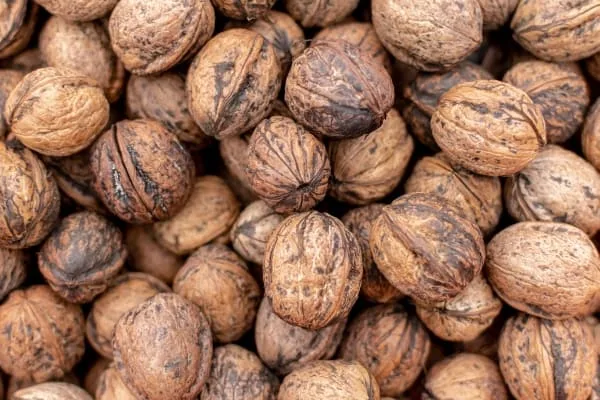
Dealing with Stale Walnuts
Stale walnuts are still okay to use. Some ways to get the most out of them include:
- Toasting them. You can toast nuts in the oven or on the stove, depending on your preferences. Toasting won’t make your nuts as good as fresh walnuts, but it’ll enhance the flavor, if only for a couple of hours.
- Using them in salads or stirring them into desserts. In either case, walnuts will add some nice crunch without altering the flavor much if you only add a little. That’s a win-win in my books.
- Adding them to baked goods. Using up your old walnuts shouldn’t be an issue if you’re into baking. Almost any muffin, cupcake, and shortbread recipe can benefit from extra chopped walnuts. Or, if you’re feeling adventurous, you can try a new walnut recipe and see how it goes.
How Long Do Walnuts Last?
Unshelled walnuts keep for at least half a year at room temperature and more than a year in the fridge. On the other hand, shelled walnuts last for at least 3 months in the pantry and more than 12 months in the refrigerator.
Those are rough estimates based on both what trustworthy sources suggest and my own experiences. Let me explain.
Food Keeper says that walnuts’ shelf life is very limited, like 2 to 4 weeks of storage time for both shelled and unshelled walnuts. That sounds way too short based on my experiences and my parents’ having a couple of walnut trees.
The guidelines from the University of California are a bit more relaxed and state that unshelled walnuts last four months while shelled ones last three months in the pantry. For me, those estimates are much closer to the truth, especially regarding shelled walnuts.
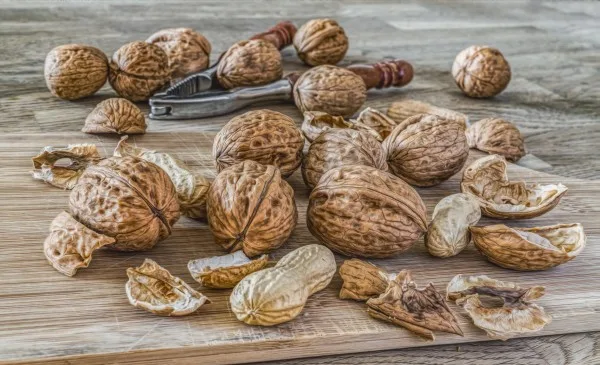
Unshelled Walnuts
The shell isolates the kernel from temperature changes, air, and light – all three factors responsible for rancidification. That means unshelled walnuts sit in much better conditions than their shelled counterparts.
Based on years of storing in-shell walnuts on the counter, I found that they keep at room temperature for more than six months. Probably even more than a year.
Of course, after those 12 months, you’ll find some rancid walnuts here and there, but the wast majority of the kernels will be a-okay.
In other words, when dealing with in-shell walnuts, crack them open before assuming they’re bad because they sat in storage too long.
Shelled Walnuts
As I mentioned in the spoilage section, walnuts are prone to going rancid, thanks to their nutritional profile. So once the shell is removed, there isn’t much that protects the nuts.
That means that unless you store them safely in the fridge, they’ll turn rancid within months if left at room temperature.
Expiration Date
If you’re buying bagged walnuts, that package will probably have a date printed on it. So, what should you do if those nuts have already “expired”?
First, that date isn’t an expiration date, only a rough estimate of how long the walnuts should last.
Second, how long walnuts stay good depends heavily on storage conditions, so I don’t think that date help that much.
In other words, instead of relying on the printed date, you should give your walnuts a quality check and go from there. This way, you don’t throw out perfectly fine nuts.
And speaking of storage conditions, let’s discuss storage options in more detail.
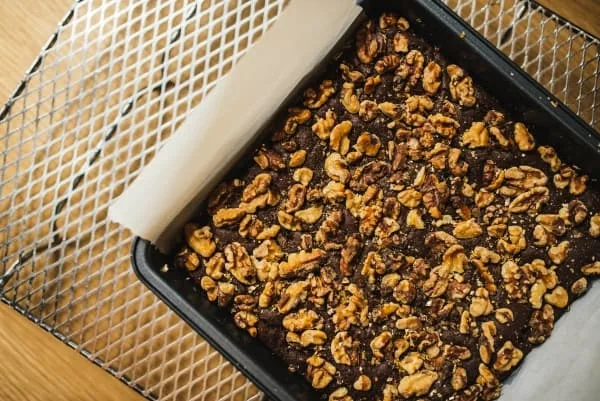
How to Store Walnuts
Store your shelled walnuts in a freezer bag or airtight container in the fridge for about a year. For in-shell walnuts, you can leave them at room temperature in a ventilated bag, or place them in a bag or container and refrigerate.
To keep your walnuts from going rancid as long as possible, you protect them from air, heat, and light. That’s what storing walnuts is all about.
How you go about that depends heavily on whether your walnuts are shelled and if you refrigerate them or not.
Refrigeration
You don’t need to refrigerate walnuts, but refrigeration is an excellent option if you want yours to last as long as possible. The only one that’s better is freezing, which we’ll cover in a moment.
For shelled walnuts, refrigeration is what I recommend, especially if you need them to last more than a couple of months.
All you need to do is transfer the nuts to a plastic bag or resealable container and chuck it in the fridge. The refrigerator protects the nuts from heat and light, and the bag or container limits how much fresh air is around.
When it comes to unshelled walnuts, use a storage bag or any other moisture-proof packaging.
While the intact shells provide ample protection against oxidative changes, you still don’t want any moisture nearby. And that’s why I recommend a bag.
Now, if you can’t fit your walnuts in the fridge, let’s talk about storing them at ambient temperature.

Room Temperature Storage
Unshelled walnuts should sit in a cool, dry, and dark place
You can either pack them in a resealable bag or container, or leave them in a ventilated container or bag. The shells provide a lot of protection for the kernels, so the differences in storage time between the two options should be minimal.
Those same options work for storing in-shell hazelnuts (Do hazelnuts go bad?), pecans (Do pecans go bad?), and peanuts (How long do peanuts last?).
For shelled walnuts, pack those walnuts into a freezer bag or airtight container and place them in a cool and dry place. Only the packaging protects the nuts, so going with something that you can seal tight is a must.
(Unless, of course, you don’t mind your walnuts going rancid within a month or so.)
Having covered the two popular storage options, let’s talk about freezing.
Can You Freeze Walnuts?
Walnuts freeze perfectly fine, and freezing is a great way to ensure your shelled walnuts last as long as possible.
You can, of course, freeze unshelled walnuts. The thing is, they retain quality for quite a long time, even at room temperature. Plus, they take way more space than shelled walnuts.
That makes shelled walnuts better candidates for freezing than their unshelled counterparts.
If you want to freeze your walnuts, here’s how:
- Place the walnuts in a freezer bag.
- Squeeze out the air.
- Seal the bag.
- Freeze the nuts.
After a minute or so of work, you should be done and your walnuts safely in the freezer.
To use frozen walnuts, scoop as many as you need from the bag and let them warm up on the counter for half an hour or so. That should be enough to make them ready for snacking.
If you’re using them in baking, you can probably skip defrosting and use them straight from the freezer.
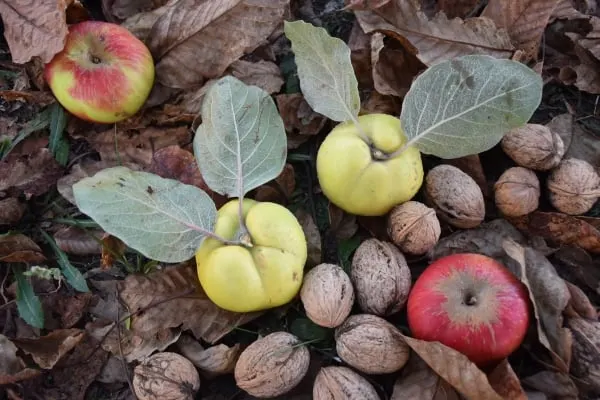
Walnuts Shelf Life and Spoilage Summary
Thanks for reading. Here are the main takeaways from this article:
- Walnuts go rancid. If you want yours to last as long as possible, choose in-shell walnuts, as the shell protects the kernel against spoilage quite well.
- Rancid walnuts taste sharp and bitter, sometimes smell like rancid oil, and might shrivel and darken. Flavor change is the most reliable spoilage indicator.
- Pre-bagged walnuts come with a best-by date that’s only an estimate of how long the nuts should last. Walnuts usually keep quality well past that date, so you shouldn’t rely on it.
- You can store unshelled walnuts in a cupboard at room temperature for at least half a year or refrigerate them for more than a year. Shelled walnuts don’t keep as long but should retain quality for at least three months in the pantry and a year in the fridge.